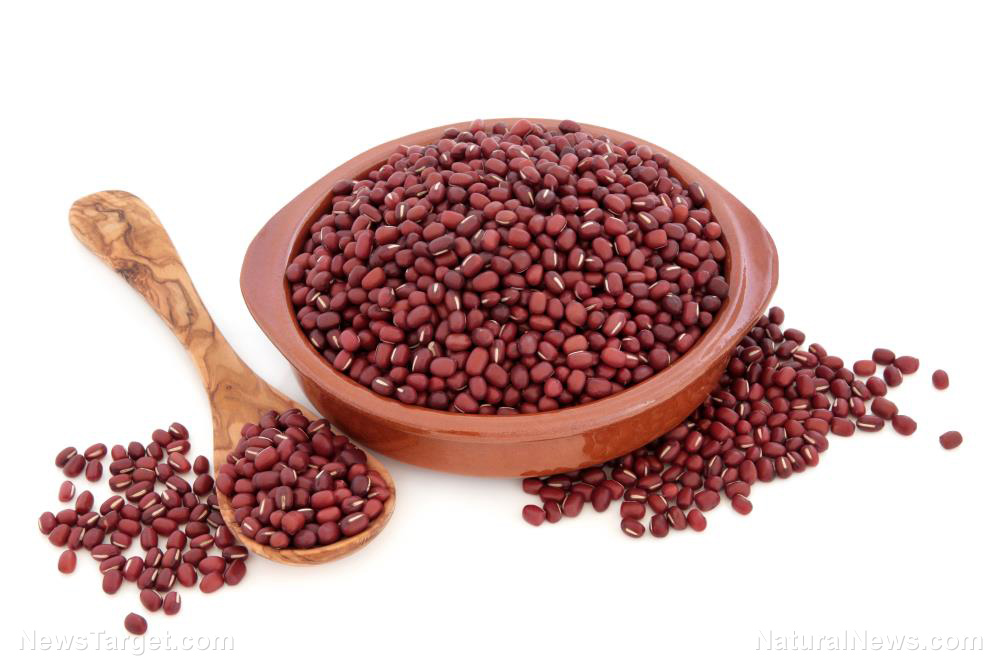Adzuki beans, one of the more popular legumes in East Asia, has been studied to have potent antioxidant and anti-inflammatory effects
11/06/2018 / By Ralph Flores

It’s unfortunate that not a lot of people know of adzuki beans. These beans are native to East Asia, where people consider them to be an important legume. In those regions, the beans are used as a natural sweetener, thanks to its distinct sweet and rich flavor. However, it’s not the ability to act as sweetener – from pancakes to ice cream – that makes the beans interesting; rather, it’s their multiple health benefits that make them a food worth knowing. A study made by South Korean researchers, in particular, highlighted the beans’ anti-inflammatory and antioxidant properties. Their findings, which appeared in the Journal of Medicinal Food, looked at the effects of black adzuki beans (Vigna angularis) in mice that were fed a high-fat diet.
In the study, the found that black adzuki beans significantly reduce biomarkers that indicate inflammation. The beans also weakened its effect on the colon, based on the results of tissue and serum analysis. This meant that adzuki beans not only reduces inflammation in the colon, it can also protect it from disorders caused by the condition.
The link between adzuki beans and inflammation
The anti-inflammatory properties of adzuki beans were the highlight of a study led by Peking Union Medical College in China. The study, which appeared in this year’s Therapeutics and Clinical Risk Management, exhibited the ability of adzuki beans to inhibit inflammation in patients with Type 2 diabetes.
For the study, researchers used adzuki beans which were processed into pasta and powder. Then they led a four-week randomized controlled trial to determine the beans’ efficacy. The trial involved 120 patients with Type 2 diabetes, who were assigned to eat either a low-glycemic diet or one that had adzuki beans. The participants’ diet information and blood samples were collected at baseline and at the end of the four weeks. These were analyzed for certain biomarkers for inflammation and glucose control.
Researchers found that patients who ate extruded adzuki beans had better glycemic control than those who ate a low-glycemic diet. This meant that the patients were able to manage their blood glucose levels, which is important for controlling diabetes. The team also noted significantly reduced inflammation for patients given adzuki beans. In particular, they found a decrease in pro-inflammation biomarkers.
“Extruded red adzuki bean convenient food can be used to help patients with T2DM [Type 2 diabetes mellitus] optimize [their] dietary patterns and increase protein intake while reducing total energy intake,” researchers explained in their report. “[It] was [also] easy to cook and tasted good, leading to patient compliance.”
The antioxidants in adzuki beans
Adzuki beans don’t just taste great, they are also rich in antioxidants. A study funded by the Spanish National Research Council identified at least 29 compounds in adzuki beans. In particular, researchers noted that these compounds have potent antioxidant properties, which they believe could be used in functional food and other healthy food preparations. Of the phenolic compounds, the dominant ones include catechin, epicatechin glucosides, procyanidin dimers, myricetin, and protocatechuic acid. Studies on adzuki beans are also promising, with researchers considering it as a replacement for synthetic antioxidants, which carry the risk of side effects. (Related: Scientists explore exotic species of legumes as potential alternative sources for human and animal nutrition.)
Of course, these beans aren’t highly sought after for just their antioxidant and anti-inflammatory properties. Research has shown that adzuki beans contain dietary fiber, which treats digestive problems. A single serving of adzuki beans provides nearly half of the recommended daily allowance for fiber, making it an important legume for gut health. Adzuki beans also contain at least 60 percent of the iron that a person needs for the day, which makes these beans invaluable for improving brain function and blood flow.
Learn more about adzuki beans and its other benefits at Food.news.
Sources include:
Submit a correction >>
Tagged Under:
This article may contain statements that reflect the opinion of the author
RECENT NEWS & ARTICLES
COPYRIGHT © 2017 SUPER FOODS NEWS





















